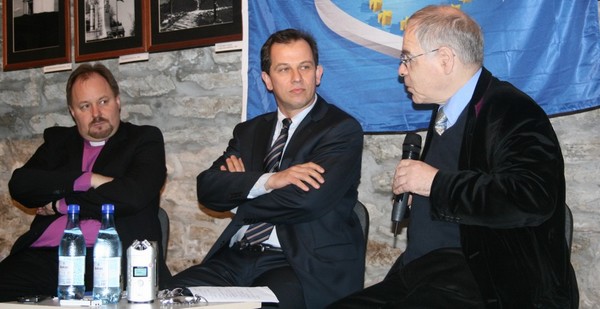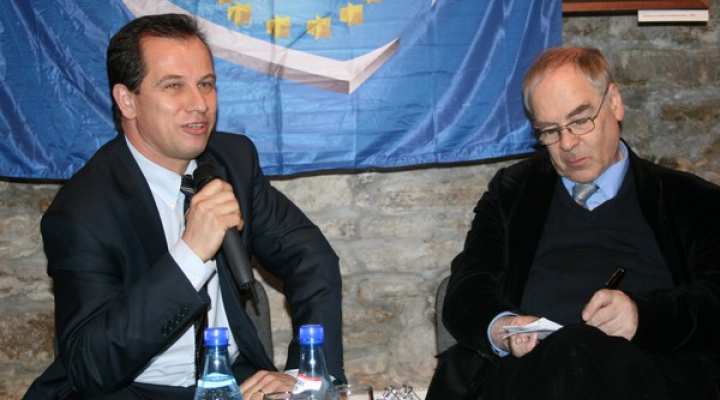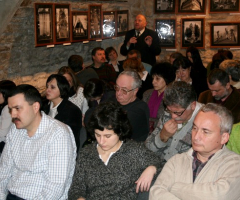Dr. György Schöpflin was Csaba Sógor’s guest
The series of events entitled European Discussion Nights, initiated by DAHR’s MEP Csaba Sógor arrived at its second edition. Organized once again at the Járosi Andor Christian Cultural Workshop, the program’s guest was MEP Dr. György Schöpflin, who delivered a speech entitled „Hungarian country Image: constitution, media law, Hungarian in Diaspora”.
After the greeting words of Lutheran Bishop Dezső Adorjáni, the host of the evening, MEP Csaba Sógor spoke about the goals of the event series. He said that the reason behind organizing the European Discussion Nights was to bring Europe and the European Union closer to the Hungarians living in Transylvania, but also to familiarize the visiting foreign MEPs with the situation of the Hungarian community here.
In his speech, Dr. György Schöpflin stated that Hungary’s constitution has not changed from a structural point of view since the beginnings of the communist regime. He believes that the regime change in Hungary did not bring any real changes in this field, so the current revision of the constitution can be considered the completion of the transition period. About the media law in Hungary that has generated much debate in the international media, Schöpflin said that the media, by the characteristics of its activities, represents a branch of power within the state, thus the Hungarian government has the responsibility to regulate this use of power with regard to the public good. According to his statement, the law is inspired by similar European laws and the media offensive against it is a means for the European left to find it way again, a pretense to strike at its political adversaries.
The third subject of the evening, the situation of Hungarians living outside the borders of Hungary, was addressed by Schöpflin saying that it is the duty of every Hungarian government to ensure that these communities feel that they are being cared for. „I would like to see a process begin, where Hungarians from all over the world can come to Hungary as equal partners. The recent decision of giving Hungarian citizenship to these people is an important step in this process” – said the MEP. He also mentioned that the French „francophone” idea could be used to build a Hungarian version of it: a „hungarophony” should be established where the great Hungarian dialogue would take place independently of the level of knowledge of the language of the individual, where a common Hungarian conscience could be created that would span over the state borders.
During the discussion following the speech the two MEPs rejected the opinion saying that the Hungarian Presidency of the EU does not take into account the issue of minorities. The issue was addressed in detail by MEP Csaba Sógor, who explained that during the Presidency, Hungary’s main duty is to work efficiently with the other member states, coordinating the work of governments and ministers.

- There are several issues on the EU-s agenda that Hungary needs to keep in the spotlight and carry forward. Hungary can strengthen its position in the EU through a good Presidency, so it is important that beyond promoting its own interests, Hungary also needs to pay attention to the work being done in cooperation with other countries. During the Presidency, Hungary will have to work in an environment that is not susceptible enough to the issue of minorities, so it is advisable to somehow package the minority issue – said the Hungarian MEP from Transylvania, who believes that Hungary has a chance to accumulate capital during its Presidency, that can later be used to further the progress of minority rights protection.
The soon to be initiated Danube Strategy is a great opportunity for this because it encourages cross-border cooperation and consultations based on common values. Referring to a comment made by Hungarian Foreign Affairs Minister János Martonyi, according to whom we must not abandon the cultural and linguistic diversity of Europe because it is not only a strength of Europe, but a source of creativity as well, Csaba Sógor also stated that he believes there is a chance that minority interest will appear in EU programs like the Danube Strategy.
The MEP also emphasized that minority issues need to be addressed with caution with regard to the Hungarian-Romanian bilateral relations. – The cooperation of Hungary and Romania is heading in the right direction after a very long time, but there are still some uncomfortable issues like the opinions about the common history and the question of cultural and territorial autonomies, that can create a rapture in the relations between the two states. Success in the field of minority rights can only be achieved if we maintain the dialogue. The favorable provisions of the new education law in Romania can be considered results of such dialogues – explained Sógor.
In his speech, Dr. György Schöpflin stated that Hungary’s constitution has not changed from a structural point of view since the beginnings of the communist regime. He believes that the regime change in Hungary did not bring any real changes in this field, so the current revision of the constitution can be considered the completion of the transition period. About the media law in Hungary that has generated much debate in the international media, Schöpflin said that the media, by the characteristics of its activities, represents a branch of power within the state, thus the Hungarian government has the responsibility to regulate this use of power with regard to the public good. According to his statement, the law is inspired by similar European laws and the media offensive against it is a means for the European left to find it way again, a pretense to strike at its political adversaries.
The third subject of the evening, the situation of Hungarians living outside the borders of Hungary, was addressed by Schöpflin saying that it is the duty of every Hungarian government to ensure that these communities feel that they are being cared for. „I would like to see a process begin, where Hungarians from all over the world can come to Hungary as equal partners. The recent decision of giving Hungarian citizenship to these people is an important step in this process” – said the MEP. He also mentioned that the French „francophone” idea could be used to build a Hungarian version of it: a „hungarophony” should be established where the great Hungarian dialogue would take place independently of the level of knowledge of the language of the individual, where a common Hungarian conscience could be created that would span over the state borders.
During the discussion following the speech the two MEPs rejected the opinion saying that the Hungarian Presidency of the EU does not take into account the issue of minorities. The issue was addressed in detail by MEP Csaba Sógor, who explained that during the Presidency, Hungary’s main duty is to work efficiently with the other member states, coordinating the work of governments and ministers.

- There are several issues on the EU-s agenda that Hungary needs to keep in the spotlight and carry forward. Hungary can strengthen its position in the EU through a good Presidency, so it is important that beyond promoting its own interests, Hungary also needs to pay attention to the work being done in cooperation with other countries. During the Presidency, Hungary will have to work in an environment that is not susceptible enough to the issue of minorities, so it is advisable to somehow package the minority issue – said the Hungarian MEP from Transylvania, who believes that Hungary has a chance to accumulate capital during its Presidency, that can later be used to further the progress of minority rights protection.
The soon to be initiated Danube Strategy is a great opportunity for this because it encourages cross-border cooperation and consultations based on common values. Referring to a comment made by Hungarian Foreign Affairs Minister János Martonyi, according to whom we must not abandon the cultural and linguistic diversity of Europe because it is not only a strength of Europe, but a source of creativity as well, Csaba Sógor also stated that he believes there is a chance that minority interest will appear in EU programs like the Danube Strategy.
The MEP also emphasized that minority issues need to be addressed with caution with regard to the Hungarian-Romanian bilateral relations. – The cooperation of Hungary and Romania is heading in the right direction after a very long time, but there are still some uncomfortable issues like the opinions about the common history and the question of cultural and territorial autonomies, that can create a rapture in the relations between the two states. Success in the field of minority rights can only be achieved if we maintain the dialogue. The favorable provisions of the new education law in Romania can be considered results of such dialogues – explained Sógor.












